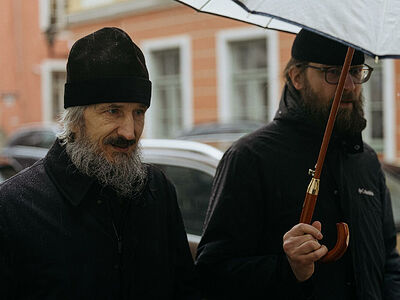Tallinn, March 27, 2025
Photo: riigikogu.ee
Estonian authorities have taken another step towards banning the Estonian Orthodox Church.
The bill on amendments to the Churches and Congregations Act, which aims to outlaw the EOC because of its canonical connection to the Russian Orthodox Church, passed its second reading in the Riigikogu, Estonian Parliament, yesterday, reports the Parliamentary press service.
If the bill passes its third reading, it will then be sent to the president for promulgation.
The Riigikogu declared the Moscow Patriarchate an accomplice in aggression  Estonian Parliament declares Russian Church accomplice in state aggression, Estonian hierarch respondsThe Riigikogu adopted a statement on Monday, May 6, which formally identifies the Moscow Patriarchate as a supporter of Russian aggression against Ukraine.
Estonian Parliament declares Russian Church accomplice in state aggression, Estonian hierarch respondsThe Riigikogu adopted a statement on Monday, May 6, which formally identifies the Moscow Patriarchate as a supporter of Russian aggression against Ukraine.
“>in May, indiscriminately applying this decision to the EOC, an autonomous body within the Patriarchate, and Pükhtitsa Monastery, which is stavropegial, directly under the omophorion of Patriarch Kirill, despite the fact that the EOC has repeatedly expressed its objection to the war in Ukraine. Estonian courts have simply  Estonian Supreme Court rejects Church’s appeal over parliamentary branding as war supporterThe Church and monastery appealed to the courts in September “to eliminate the unlawful consequences caused by the statement and exclude the Church and monastery from the list of supporters of military aggression.””>dismissed the Church’s appeals on this matter.
Estonian Supreme Court rejects Church’s appeal over parliamentary branding as war supporterThe Church and monastery appealed to the courts in September “to eliminate the unlawful consequences caused by the statement and exclude the Church and monastery from the list of supporters of military aggression.””>dismissed the Church’s appeals on this matter.
According to the bill, a church in Estonia cannot be connected to a foreign religious association if this “poses a threat to Estonia’s national security, constitutional or public order.” Ironically, state authorities have openly stated that they  Estonian gov’t sees no tangible threat from Estonian Church but pressuring its parishes to join Constantinople“We’ve already held the first [parish] meetings and plan to further expand this activity next week,” said Raivo Kuyt, Vice Chancellor for Population and Civil Society of the Ministry of the Interior.
Estonian gov’t sees no tangible threat from Estonian Church but pressuring its parishes to join Constantinople“We’ve already held the first [parish] meetings and plan to further expand this activity next week,” said Raivo Kuyt, Vice Chancellor for Population and Civil Society of the Ministry of the Interior.
“>haven’t actually see any tangible threat from the EOC.
The bill also states that “a clergyman or board member of a religious association cannot be a person who is not allowed to live or stay in Estonia,” which is clearly directed at His Eminence Metropolitan Evgeny of Tallinn, the primate of the EOC, who was  Metropolitan Evgeny forced to leave EstoniaHis Eminence Metropolitan Evgeny of Tallinn and All Estonia was forced to leave the country today after the authorities refused to renew his residence permit.
Metropolitan Evgeny forced to leave EstoniaHis Eminence Metropolitan Evgeny of Tallinn and All Estonia was forced to leave the country today after the authorities refused to renew his residence permit.
“>expelled from the country last year without cause.
The Riigikogu’s statement about yesterday’s passing of the bill reads;
The government-initiated Churches and Congregations Act Amendment Bill (570 SE) also passed its second reading, which aims, among other things, to ensure that religious organizations operating in Estonia cannot be used to incite hostility or violence.
The Estonian state stands for freedom of religion, and everyone has the freedom to choose whether and which religion to follow. However, alongside respecting the freedom of religion, belief, and association, the state must also consider challenges that threaten state security and societal safety. According to the bill, which was clarified during the proceedings, a church, congregation, or monastery operating in Estonia must not be guided in its activities by a person or association with significant influence located in a foreign country, nor be linked through statutes, contracts, or other documents or economically with a religious association, spiritual center, governing body, or spiritual leader located in a foreign country if these pose a threat to Estonia’s national security, constitutional or public order. Such a threat may exist, among other things, if the spiritual center, governing body, spiritual leader, person, or association supports or has supported military aggression or called for war, acts of terrorism, or other illegal use of armed force or violence.
The bill also clarifies who can serve as a clergyman in Estonia or be a member of the board of a religious association. A clergyman or board member of a religious association cannot be a person who is not allowed to live or stay in Estonia. Additionally, the requirements for the statutes of religious associations are clarified, and it is stipulated that if a congregation or monastery wishes to leave a church whose activities, statutes, or board composition do not comply with the established requirements, it is possible to do so by adopting new statutes and registering changes that comply with the requirements without the approval of the governing body of that church, as obtaining such approval may not be realistic.
According to the bill, churches and congregations that need to bring their statutes, board composition, or activities into compliance with the law have two months from the entry into force of the law to do so.
Follow OrthoChristian on Twitter, Vkontakte, Telegram, WhatsApp, MeWe, and Gab!




